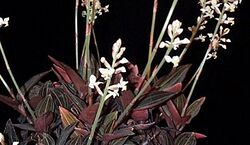Biology:Ludisia
| Ludisia | |
|---|---|

| |
| Scientific classification | |
| Kingdom: | Plantae |
| Clade: | Tracheophytes |
| Clade: | Angiosperms |
| Clade: | Monocots |
| Order: | Asparagales |
| Family: | Orchidaceae |
| Subfamily: | Orchidoideae |
| Tribe: | Cranichideae |
| Subtribe: | Goodyerinae |
| Genus: | Ludisia A.Rich. |
| Species: | L. discolor
|
| Binomial name | |
| Ludisia discolor (Ker Gawl.) A. Rich.
| |
| Synonyms[1] | |
| |
Ludisia (Lus.[2]) is a genus of orchids that was thought to contain just one species, Ludisia discolor, commonly referred to as jewel orchid. A second species, Ludisia ravanii, from the Philippines , was described in 2013.[3] Ludisia discolor is native to Southern China , Northeast India , Thailand, Vietnam, the Philippines , Malaysia, Indonesia and Myanmar,[4] and often cultivated.
Description
They are terrestrial orchids that in their natural setting would be found growing on the forest floor. They are known for their foliage, which is often velvety deep maroon with red veins that run parallel to the centre of the leaf.
Flowers are white with twisting yellow columns. Individual flowers are small but grow in clusters on upright stalks. Flowers in cultivation last a month or more.[5]
Cultivation
They need high humidity and warm temperatures with low to medium light, and they tolerate extremely low light levels.
Cultivars
Ludisia discolor has two notable cultivars:[citation needed]
- L. discolor 'Alba', an albino variant, and
- L. discolor 'Nigrescens', a mutation often referred to as "black velvet".
Hybrids
Hybrids of Ludisia with other orchid genera are placed in the following nothogenera:
- Dossisia[6] (Dsi.) = Ludisia × Dossinia
- Goodisia[7] (Gda.) = Ludisia × Goodyera
- Ludochilus[8] (Lud.) = Ludisia × Anoectochilus
- Macodisia[9] (Mcd.) = Ludisia × Macodes
Note that these hybrids are with other genera in the subtribe Goodyerinae, all commonly referred to as jewel orchids.
(The given references are to registered primary hybrids within each given nothogenus.)
References
- ↑ "The Plant List: A Working List of All Plant Species". http://www.theplantlist.org/tpl/record/kew-115489.
- ↑ Alphabetical List of Standard Abbreviations for Natural and Hybrid Generic Names, Royal Horticultural Society, https://www.rhs.org.uk/plants/pdfs/plant-registration-forms/orchid-name-abbreviations-list.pdf
- ↑ "Ludisia ravanii Cootes & G.Tiong | Plants of the World Online | Kew Science". http://powo.science.kew.org/taxon/urn:lsid:ipni.org:names:77132555-1.
- ↑ Kew World Checklist of Selected Plant Families
- ↑ Flora of China v 25 p 55, 血叶兰 xue ye lan, Ludisia discolor (Ker Gawler) Blume, Coll. Orchid. 113. 1859.
- ↑ "The International Orchid Register / RHS Gardening". http://apps.rhs.org.uk/horticulturaldatabase/orchidregister/orchiddetails.asp?ID=2833.
- ↑ "The International Orchid Register / RHS Gardening". http://apps.rhs.org.uk/horticulturaldatabase/orchidregister/orchiddetails.asp?ID=135758.
- ↑ "The International Orchid Register / RHS Gardening". http://apps.rhs.org.uk/horticulturaldatabase/orchidregister/orchiddetails.asp?ID=166415.
- ↑ "The International Orchid Register / RHS Gardening". http://apps.rhs.org.uk/horticulturaldatabase/orchidregister/orchiddetails.asp?ID=157988.
External links
Wikidata ☰ {{{from}}} entry
 |

